Walking through Doors
Liminality of Grief, Microcosms of Silence, and Whispers of the Unborn Worlds
Namaste Friends,
September has arrived, unprovoked yet dancing on the cusp of shifting winds. It is a doorway between the vanishing luminescence of the long summer, riddled by monsoon, and the autumn resting on the crisp northern winds. By the end of September, the southern winds will slowly withdraw as the warm, moist, tropical atmosphere of the Bay of Bengal becomes swaddled in blankets of morning fog. The kash grass will sprout like hope, drinking in the morning dew, while the faint fragrance of shiuli lingers in the air like a ghostly herald of autumn.
Everything in autumn is lucid. The fertile land subtly surrenders to nature’s cycles of rest, the critters and crawlers prepare for long periods of inactivity, and the sun lingers feebly, casting longer shadows through the semi-bare branches of the deciduous sheesham and pipal, which once sprawled across the landscape.
I long for autumn, more so now that it looms near the precipice of transitions. I long for the northern winds to soothe the fatigue left by summer's restless stirrings. I am waiting for the still, pregnant pause through which healing seeps, unpredictably and unmeasured. I wait to rest and to heal, even though I spent the summer doing just that.
As Georgia O’Keeffe writes in her letter to Russell Vernon Hunter:
I have done nothing all summer but wait for myself to be myself again.
Yet, I cannot deny that the illusion of self has been my primary object of contemplation. Now, I find myself in the afterlife of the self I had long awaited.
The monsoon is now waning, with sporadic showers midweek, either at noon or at night. The air hangs suspended, gently stirred by a breeze, until the sun jolts the peaceful morning into a chaotic burst of activity. As the morning progresses, the moist air turns humid, and the day drifts into a haze of rituals—bells ringing, prayers filling the air—attempting to hold the mind in a spiritual siege.
One quiet morning, when the neighbors were away with their bells, baby, and breakfast, I heard distinct, high-pitched interludes of “piu-piu". Assuming it was my cat preparing for her usual morning shenanigans, I called out to her. Maya didn’t respond with her scornful trill like she usually does, which meant she was either eating or taking her morning nap in the study. A moment later, I heard the sound again and traced it to the balcony. There, on the handrail, sat a beautiful chatak (pied crested cuckoo), tilting its head and holding me in its gaze.
In such everyday miracles, human life intersects with the divine, though we often remain oblivious due to our preoccupations. Yet, in that brief moment, an acknowledgment of existence passed between us — two beings (the bird and I) who travel through the doors of life and death alike. The microcosm of our exchange was rich in silence—the kind that speaks louder when one quiets the inner chatter.
In ancient Indian poetry, like Kalidasa's Meghadūta1, the chatak holds spiritual significance, symbolizing deep yearning, much like the Portuguese concept of saudade—a love that lingers even after everything is lost. I, too, harbor a deep longing for a place in this world that I love but can no longer touch—a past, a dream, an imagination? I’m unsure. All I know is that it feels like I have memories from a time that doesn’t exist, yet feels real.
Could this winged visitor be a sign from the universe, offering reassurance against my fear of abandonment, of dying without ever having known what "home" truly is? Since this brief encounter, I haven’t stopped thinking about the nature of arrivals and omens. In the words of my sister, Freya Rohn:
I tend to seek out omens in times like this—not necessarily with belief, but rather as hints that might point to a line of thought, might echo something in the whir I can’t help but sort through. A feather in an unexpected place on a walk; the appearance of an unfamiliar bird at the windowsill. Some kind of hard mercy to shrive the mind.
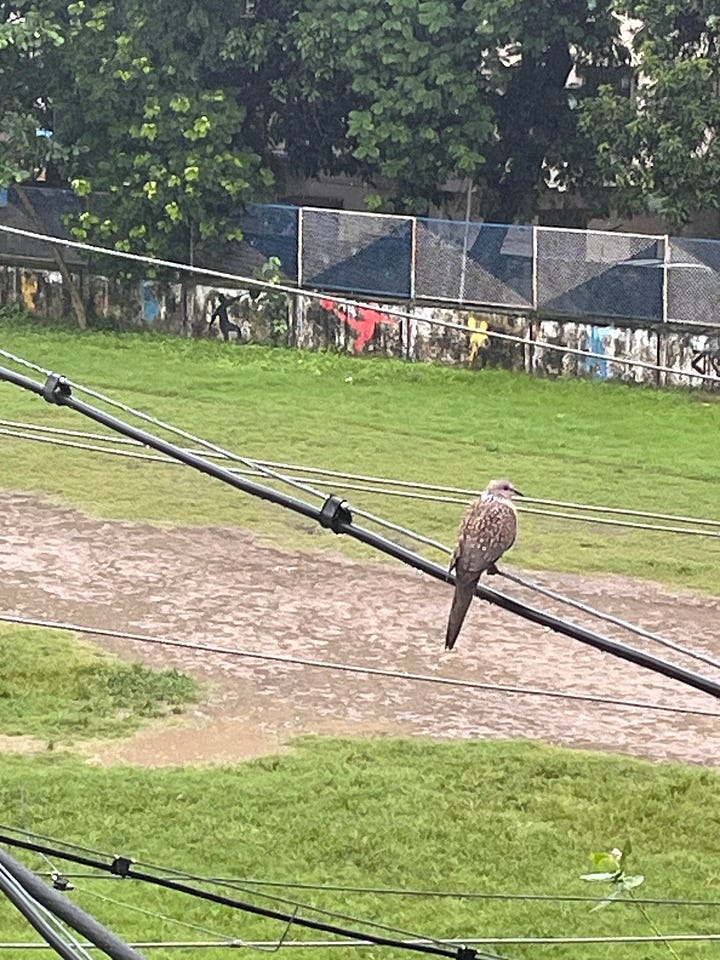
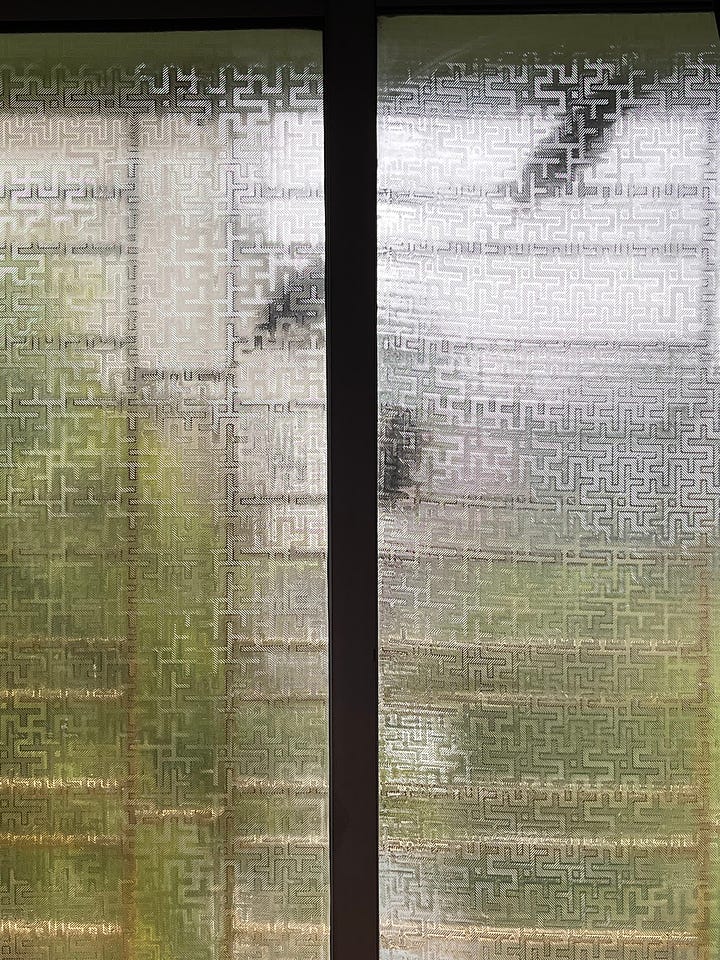
My friends who have known me for a while are aware of my deep love for Hayao Miyazaki. Only a few weeks after my father’s death, Miyazaki’s long-awaited film The Boy and the Heron was released in my city. It was difficult for me to venture out during those early months. The stranger I had become to myself was slowly leaving my body, one day at a time, making room for the awareness I truly am. It felt like a kind of death at the time, but looking back now, I see that it was a necessary phase of transformation.
My husband insisted that we shouldn’t miss this movie, as it touches on familiar themes of grief, especially over the loss of a parent. After all, the film’s original Japanese title, Kimitachi wa Dō Ikiru ka, literally translates to How Do You Live?—inspired by, though not based on, the book of the same name by Genzaburō Yoshino, which Miyazaki has mentioned as his favorite childhood book. It’s fitting, isn’t it, that he named what is supposedly his last film after a book he cherished as a child? When we reflect on our lives, don’t we often return to our childhood selves, to re-evaluate our journey and the choices we’ve made?
Miyazaki uses the symbolism of doors and hallways more liberally in this film than in his other works. In Miyazaki's world, doors often represent a passage between the material and the transcendental. Hallways, I imagine, symbolize a psychological space for contemplating the many choices one makes. This symbolism likely reflects Miyazaki's own life and the choices of his past. But I think the question Miyazaki posed by the end of the film wasn’t just about his past; it was about us and our future—the generations he’s leaving behind, the ones who will survive him and inherit his art. In the midst of my personal tragedies, Miyazaki’s question felt direct and genuine. It was a pure moment of sublime interaction between artist and fan, where the artist speaks not from the vantage of his art but from within the psyche of his fan.
The part of me that resonated with the artist asked myself: What now? Now that the doors to the past have slammed shut with the finality of death, now that the world feels like it’s spinning out of control, now that I’ve internalized the reality of my own impermanence—how do I live now?
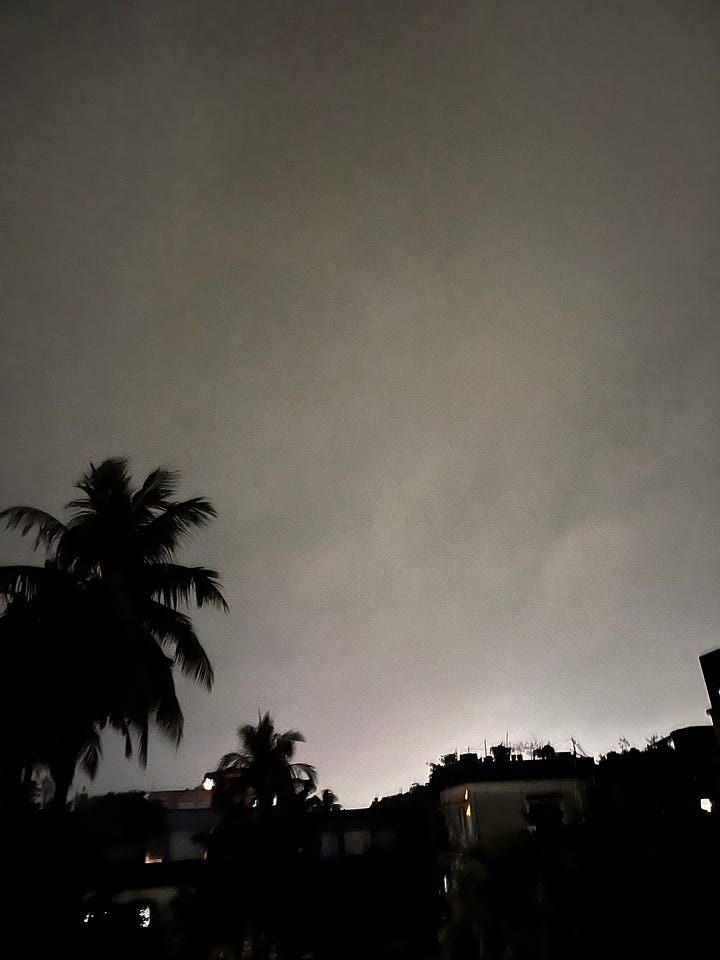
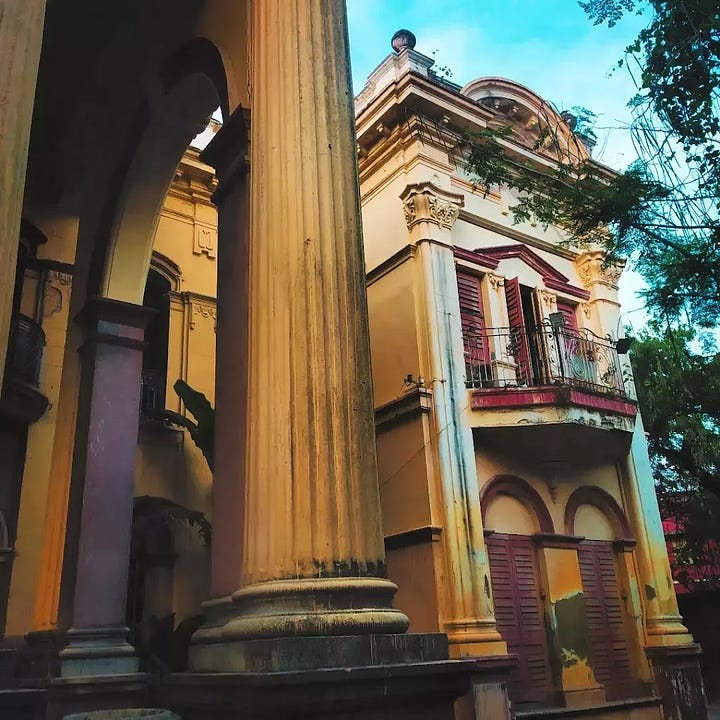
The space between morning and dusk isn’t a dimension of time; it’s a dimension of space—filled with myriad shades of purple and blue. As the stormy depression sweeps through the Bay of Bengal this week, this liminal space, belonging to no particular time, seems to wait endlessly for its observers. I yielded to the universe’s call to be seen and understood on the last stormy night, when the sky almost spoke in inundated tongues of silence—of secrets from eons past, of starless nights that once loomed over the lands of my ancestors.
On such a night, I think of my father and his need to be held and understood in his loneliness. I think of my own presence, and wonder how long it will take for me to fully arrive. I remember another night like this one, when I was returning from his cremation. The old, dilapidated bungalows2 lining the archaic boulevards of the city beckoned to me in the quiet of the night. These ghostly colonial remnants — once villas of Zamindars3 —stared at me through empty, unhinged windows, hidden behind the hanging shoots of centuries-old banyans — doors open and gasping with a faint recollection of the past.
As we sped past them in a blur, I asked myself: if they could speak, what stories would they pour into the liminality of this timeless space between morning and night?
It is silly that we humans attach so much value to arriving at a destination when the whole story unfolds during the travel. We are so governed by the clocks, by the mirrors, by the mechanisms of trap created by our own minds — that we often forget time and beauty are concepts to be perceived, not judged. When we judge rather than experience, we fail to fully grasp them. Time is infinite, and beauty is seamless in the gravity of one’s presence, in spaces where there is no separation from what one is observing. But for those who analyze, both are limited.
I dream of a life beyond clocks and mirrors, where the lens of observation isn’t a mechanism to weigh us all by the same scales of numbers or symmetry. A world where we can live by the whimsical order of nature, where gravity and time aren’t divided into dimensions, and where labels are abandoned for a higher sense of beauty that is inherent and universal.
I am not sure such a world is waiting to be born, or if she can even be conceived by those of us who might survive the catastrophe of our collective greed. But if her arrival is destined, I imagine she will evolve far beyond the principles and metrics of the West, beyond the standardized systems and the exoskeleton of post-colonial frameworks on which the current world is built.
I am convinced that such a world is possible. I have touched it now and then, from the periphery of my grief—soft frills of a veil between the material and immaterial. Losing a loved one brings many moments of harsh truth, like the times when their belongings need to be packed or given away. As I arranged my father’s things in a large suitcase, each item spoke to me in those quiet moments of reconciliation. The silence hung like a shroud of melancholy over me as I touched his shaving kit, glasses, perfume, faux leather belts, and the soft cotton shirts he had neatly ironed with his own hands.
I don’t remember if I cried, and it doesn’t matter. All the tears in the world could not contain the grief of a loss so final. Surviving those moments and living with them, too, requires a kind of courage—soft, yielding, and necessary. I’ll admit I’m not good at it. It’s been five months since my father’s passing, and I still cling to his things as though they contain him, even though I know better. Not long ago, I fought bitterly with my mother over his winter clothes, which he loved so much that he hand-washed each one, even when he was so terribly sick. Every fiber and thread of those sweaters holds my father’s love, and I’m not ready to let them go—not yet.
The body may be limited in its abilities and existence, but love transcends the physical realm of our five senses. Love, like the world we await, is a dimension of hope, vision, and the toil of today. It permeates through space and time, making its presence felt even in the grim desolation of the present. I have shifted the veil and touched the deathless; I know it’s there, and I’m not ready to let go of that vision.
As I walk through the doors of this house, I think of her memory, her past, and the everyday unfoldings and eventualities she has witnessed. Whose eyes will she catch in the visceral passage of time? Whose quietened heart will her windows speak to? What fragment of someone’s imagination will I become when they look at this house — a haunting shadow in their living experience, should they choose to walk through these doors? Though my experience and that of the future passersby are separated by eras, our experiences of love and loss are rooted in the same shared human ancestry.
Just as I interacted with the old, dilapidated house, my eyes awash with tears and my heart heavy with grief after witnessing my father pass through his final rite of life — the smoky curtains of fire, I felt a profound empathy for the long-dead inhabitants of those homes. They, too, must have faced insurmountable grief. That moment jolted me back to the present, dissolving the doors of perception. I was awakened to the beauty of walking through this city, which is over three hundred years old.
I realized then the futility of our assumptions about the degree of our separateness—between past and present, between them and us, between the knowable and the unknowable. It doesn’t matter what labels we assign or how long we deny it; all of this existence is interconnected.
Friends and family patted me on the back, reassuring me that I was brave for walking through the doors of fear, loss, and the eternal hauntings of the past. But is it really me who walked through them, or is it the timeless, ageless knowing that endures beyond all tragedies —a generations-old light that shines through—an inheritance?
The great silence of the unspeakable reality has many voices that whisper through the mundane. It has something to say—in the shifting of light and the shadows it casts, in the eclipses of the moon, in the stillness of the atmosphere before it breaks into a storm, in the weeks-long incessant downpours demanding pause, demanding attention that we are still inadequate to give. It has something to say, but are we ready to listen?

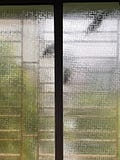

“Whose eyes will she catch in the visceral passage of time? Whose quietened heart will her windows speak to?” Gorgeous, haunting writing. Thank you, Swarnali.
There is so much in this essay to sit with, to reflect on, to explore, to allow to unfold. Thank you for gifting us with this map of your internal and external process, Swarnali. Trivarna said it well -- gorgeous, haunting writing. Not to be quickly taken in, but to be with over time.